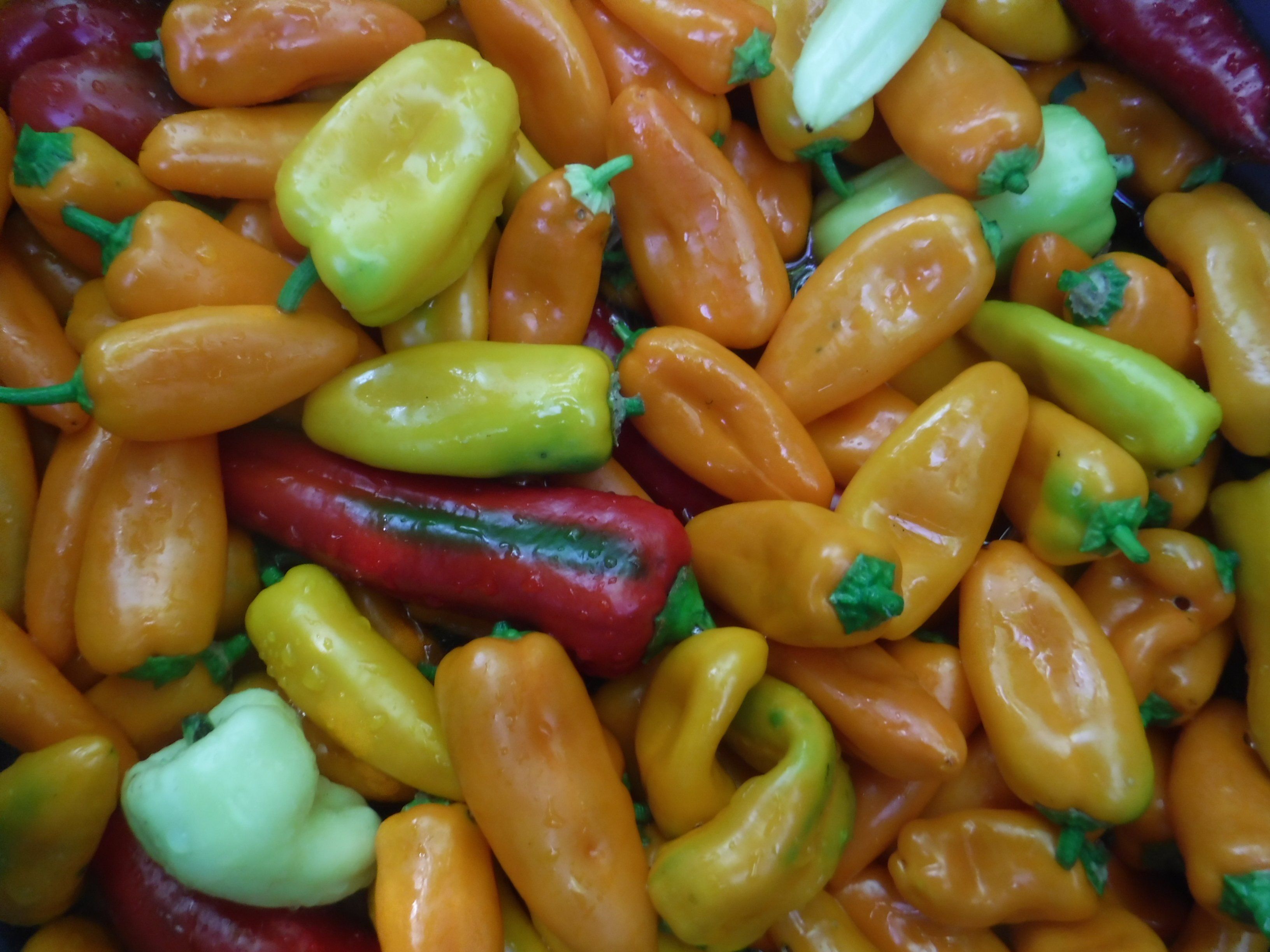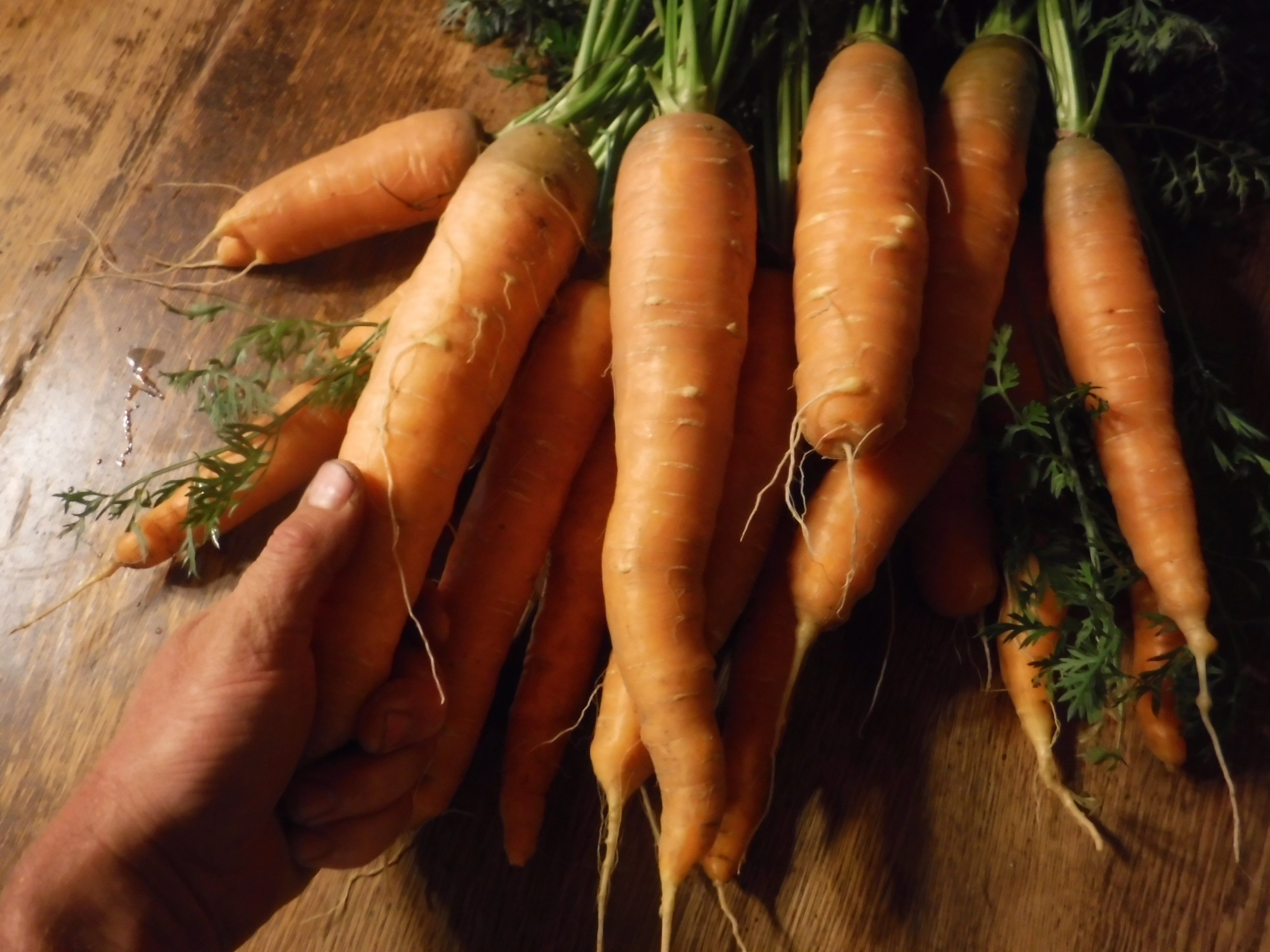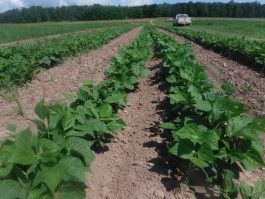As usual, a few logistics to cover first:
1. We've had several requests for bulk tomatoes from folks who want to make some salsa or freeze tomatoes for soup later, so this week we'll begin offering 5# bags of our organic tomatoes as an option to include in your veggie boxes. As the season progresses and more field plantings begin to mature, we plan to offer bulk green beans and broccoli for your boxes as well, so stay tuned!
2. For those of you who get the Plus Add-on, your boxes will include 2 more packs of delicious Happy Hollow Creamery cheese.
Now for the farm news!
Earlier this week, I got some strange looks from my neighbors as they drove by. All of the farmers around here have been taking advantage of this sunny, dry weather and were out cutting hay. Their fields are all cut nice and even, raked into tidy rows, and baled up in big round bales to be saved up for livestock feed this winter. Most of the fields have been cut once already, and the second crop of hay is coming off now. Second crop yield is always much smaller than first crop, but the game for them is more about quality than quantity of forage this time of year. Stems and grass that has headed out are not very palatable for livestock, nor do they have much nutritional value - that stuff is mostly just carbon (like straw.) The leaves of the grass are where the good stuff is, and what they are after to harvest for feed.
Earlier this summer I seeded some annual grass called sorghum-sudan grass as a cover crop in the field right next to the road. "Cover crops" like this help keep the soil covered (aptly named, eh?) to reduce erosion and help smother weeds so we can reduce the weed population in the soil BEFORE we fill the field with a bunch of veggies. Along with the grass, I seeded an annual legume called sunn hemp to help fix nitrogen into the soil. Tiny bacteria colonize the roots of legumes, creating nodules on the roots, and these bacteria actually take nitrogen from the environment and "fix" it into the soil. It's about the closest thing to "free fertilizer" you can find, and many organic growers rely on nitrogen fixing bacteria to help provide the fertility for their crops instead of relying on synthetic fertilizer. Mowing the crop terminates the growth, which adds not only the organic matter from the crop all chopped up (think "compost-in-place") but the nitrogen fixed by the bacteria for next year's crop to use. See those bumps on the roots here by my thumb? That's from the bacteria doing their job. Nature is pretty cool.
The reason I was getting the stares was because while all of them were busy cutting grasses and legumes to bale them up, here I was chopping all of mine down into fine bits with a mower instead of baling it for livestock feed. This field was tall and really lush - it would have made awesome livestock feed for animals (I have seen some of them even grow this sorghum-sudan grass specifically for forage/livestock feed). While they were harvesting their 10-12" high fields, the crazy organic guy was just mowing his gorgeous field of 4-5' high sorghum-sudan grass down and leaving it to rot....?!
What they weren't realizing though is that in the end, I AM feeding it to livestock - just not livestock that you can see above ground. Earthworms and hundreds of other types of smaller underground "critters" will be chowing that organic matter down and turning it into long chain carbon in the soil. These long chain carbon molecules help build soil structure, making it less prone to erosion, improving soil tilth. Feeding these underground livestock is really important to maintaining biologically active soil. I have read that just in the top few inches of a single acre of soil, there are over a TON of little underground livestock that need to be fed. Two thousand pounds of microbes is a whole lotta microbes! By planting and mowing cover crops, we're doing our part to keep the soil alive and help build more carbon-rich soil that is less affected by big rain events like we've seen over the last few years and easier for our veggie roots to grow in. As an organic farm, we need to rely on natural processes to solve problems instead of synthetic inputs, and mowing down cover crops is just one part of keeping that system healthy.
Another big project this week has been getting the winter beets weeded. You can see farmers Eric (left) and Ryan above as we are working through the weedy beets - no easy task! Small seeded crops like beets and carrots continue to require hand weeding here, but I hope that with more cover cropping (weeding the soil before the crop is planted) and more timely cultivation we can reduce the amount of hands-and-knees weeding we have to do. Here's a look at what a bed of beets looks like after we've finished hand weeding - so nice and clean! Only 12 more beds to go... uffda. You can see some of them at the left of this picture - the good news is I think we'll be through them by the middle of next week.
To the right of those beets, you can see a planting of green beans that are just starting to flower (we'll start picking them in about 2 weeks or so). Those beans were planted in the same field as the beets, with the same weed pressure from all that foxtail grass, and believe it or not have never been hand weeded! Timely cultivation with our tractors has done a great job at knocking back the weeds when they were tiny, and those beans are a testimony to the power of steel in the field for organic weed management. Here's a closer look at those tidy beans. I have lost track of the score of weeds vs. farmers here (weeds are probably still ahead!) but those beans are a definite point for us farmers.
Here's to another productive week ahead, more cucumber salad, and maybe a little rain this weekend. It's getting dry and we could actually use some precip, so if it ruins your outdoor weekend plans, at least you know it's helping to grow the food you will enjoy next week! Take care.
In community,
Chris Duke
Farmer, Great Oak Farm









